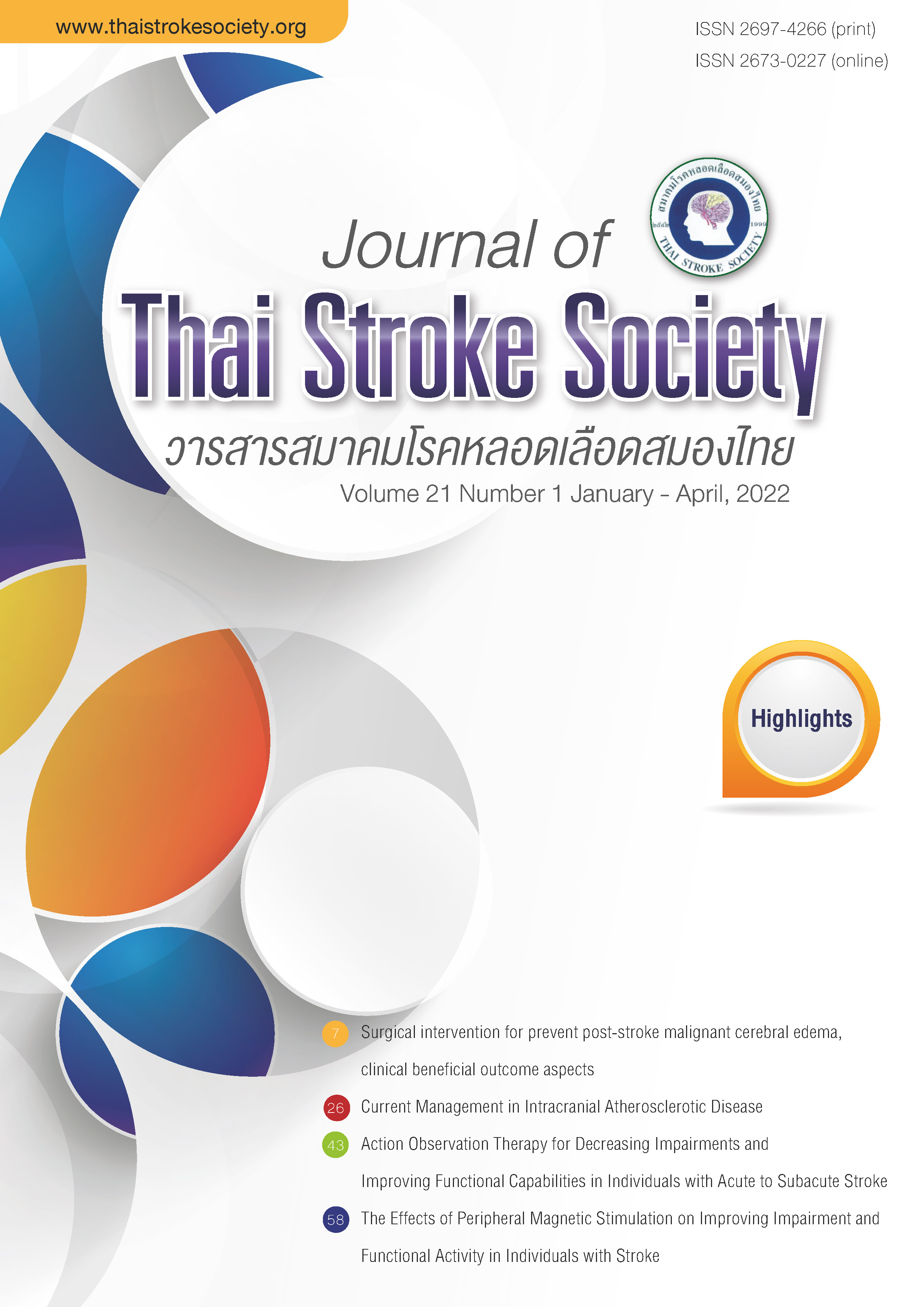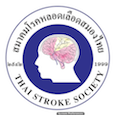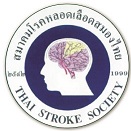Surgical intervention for prevent post-stroke malignant cerebral edema, clinical beneficial outcome aspects.
Keywords:
Malignant cerebral edema, Acute ischemic strokes, decompressive craniectomy, modified Rankin ScaleAbstract
Background: Acute ischemic strokes can develop post-stroke malignant cerebral edema. Surgical intervention known as decompressive craniectomy (DC) can decrease mortality but there is not evidence support for clinical beneficial outcome. The aim of this study assess beneficial outcome in surgical intervention for prevent post-stroke malignant cerebral edema.
Methods: Non-randomized, prospective, observational cohort study from 2016 to 2021 in 243 Subjects with acute ischemic stroke involving the middle cerebral, internal carotid artery, or both. Analyses of parameters affecting clinical beneficial outcome according to the modified Rankin Scale (mRS) at 3 and 6 months follow up were performed.
Results: Risk factors after multivariate analysis were onset to DC, tobacco use, NIHSS at admission, peripheral arterial occlusive disease, diabetes mellitus, body mass index (BMI), coronary artery disease, age more than 70 year and left side large-territory infarction. Age ≤ 71 year (AUC=0.955, p-value <0.001 accuracy 89.7%), onset to DC ≤ 9 hours (AUC
=0.824, p-value <0.001 accuracy 78.8%), volume of infarction ≤ 155 cm3 (AUC =0.939, p-value <0.001 accuracy 93.6%) and ASPECT score ≥ 6 (AUC = 1, p-value <0.001 accuracy 100%) were significantly parameters affecting clinical beneficial outcome.
Conclusion: Surgical intervention for prevent post-stroke malignant cerebral edema, age ≤ 71 years, onset to DC ≤ 9 hours, volume of infarction ≤ 155 cm3 and ASPECT score ≥ 6 associated with clinical beneficial outcome.
References
Vahedi K, Hofmeijer J, Juettler E, Vicaut E, George B, Algra A, et al.Early decompressive surgery in malignant infarction of the middle cerebral artery: A pooled analysis of three randomised controlled trials.
Puetz V, Campos CR, Eliasziw M, Hill MD, Demchuk AM, Calgary Stroke Program. Assessing the benefits of hemicraniectomy: What is a favourable outcome? Lancet Neurol 2007;6:580.
Krieger DW, Demchuk AM, Kasner SE, Jauss M, Hantson L. Early clinical and radiological predictors of fatal brain swelling in ischemic stroke. Stroke. 1999;30:287-292.
Hacke W, Schwab S, Horn M, Spranger M, De Georgia M, von Kummer R.’Malignant’ middle cerebral artery territory infarction: Clinical course and prognostic signs. Arch Neurol. 1996;53:309-315.
Van Middelaar T, Nederkoorn P, van der Worp HB, Stam J, Richard E. Quality of life after surgical decompression for space-occupying middle cerebral artery infarction: Systematic review. International journal of stroke. 2015;10:170-176.
Kerrtesz A. Western Aphasia Battery. New York: Grune and Stratton;1982.
Uyttenboogaart M, Stewart RE, Vroomen PC, De Keyser J, Luijckx GJ. Optimizing cut off scores for the Barthel index and the modified Rankin scale for defining outcome in acute stroke trials. Stroke. 2005 Sep;36(9):1984-7.
Hofmeijer J, Kappelle LJ, Algra A, Amelink GJ, van Gijn J, van der Worp HB, et al. Surgical decompression for space-occupying cerebral infarction (the Hemicraniectomy After Middle Cerebral Artery infarction with Life-threatening Edema Trial [HAMLET]): A multicentre, open, randomised trial. Lancet Neurol 2009;8:326-33.
Vahedi K, Vicaut E, Mateo J, Kurtz A, Orabi M, Guichard JP, et al. Sequentialdesign, multicenter, randomized, controlled trial of early decompressive craniectomy in malignant middle cerebral artery infarction (decimal trial).Stroke. 2007;38:2506-2517.
Juttler E, Schwab S, Schmiedek P, Unterberg A, Hennerici M, Woitzik J, et al. Decompressive surgery for the treatment of malignant infarction of the middle cerebral artery (destiny): A randomized, controlled trial. Stroke. 2007;38:2518-2525.
Gupta R, Connolly ES, Mayer S, Elkind MS. Hemicraniectomy for massive middle cerebral artery territory infarction: A systematic review.Stroke 2004;35:539-43.
Arac A, Blanchard V, Lee M, Steinberg GK. Assessment of outcome following decompressive craniectomy for malignant middle cerebral artery infarction in patients older than 60 years of age. Neurosurg Focus 2009;26:E3.
Vahedi K, Vicaut E, Mateo J, Kurtz A, Orabi M, Guichard JP, et al. Sequentialdesign, multicenter, randomized, controlled trial of early decompressive craniectomy in malignant middle cerebral artery infarction (decimal trial).Stroke. 2007;38:2506-2517.
Carter BS, Ogilvy CS, Candia GJ, et al. Oneyear outcome after decompressive surgery for massive nondominant hemispheric infarction. Neurosurgery 1997;40:1168-76.
Walz B, Zimmemann C, Bottger S, et al. Prognosis of patients after hemicraniectomy in malignant middle cerebral artery infarction. J Neurol 2002;249:1183-90.
Koh M, Goh K, Tung MYY, et al. Is decompressive craniectomy for acute cerebral infarction of any benefit? Surg Neurol 2000;53:225-30.
Nakayama H, Jorgensen HS, Raaschou HO, et al. The influence of age on stroke outcome. The Copenhagen Stroke Study. Stroke 1994;25:808-13.
Foerch C, Lang JM, Jochen K, et al. Functional impairment, disability, and quality of life outcome after decompressive hemicraniectomy in malignant middle cerebral artery infarction. J Neurosurg 2004;101:248-54.
Uhl E, Kreth FW, Elias B, et al. Outcome and prognostic factors of hemicraniectomy for space occupying cerebral infarction. J Neurol Neurosurg Psychiatry 2004;75:270-4.
Forsting M, Reith W, Schabitz WR, et al. Decompressive craniectomy for cerebral infarction: an experimental study in rats. Stroke 1995;26:259-64.
Cho DY, Chen TC, Lee HC. Ultra-early decompressive craniectomy for malignant middle cerebral artery infarction. Surg Neurol 2003;60:227-32.
Barber PA, Davis SM, Darby DG, Desmond PM, Gerraty RP, Yang Q, et al. Absent middle cerebral artery flow predicts the presence and evolution of the ischemic penumbra. Neurology. 1999;52:1125-1132.
Downloads
Published
How to Cite
Issue
Section
License
Copyright (c) 2022 Journal of Thai Stroke Society

This work is licensed under a Creative Commons Attribution-NonCommercial-NoDerivatives 4.0 International License.
ข้อความภายในบทความที่ตีพิมพ์ในวารสารสมาคมโรคหลอดเลือดสมองไทยเล่มนี้ ตลอดจนความรับผิดชอบด้านเนื้อหาและการตรวจร่างบทความเป็นของผู้นิพนธ์ ไม่เกี่ยวข้องกับกองบรรณาธิการแต่อย่างใด การนำเนื้อหา ข้อความหรือข้อคิดเห็นของบทความไปเผยแพร่ ต้องได้รับอนุญาตจากกองบรรณาธิการอย่างเป็นลายลักษณ์อักษร ผลงานที่ได้รับการตีพิมพ์ในวารสารเล่มนี้ถือเป็นลิขสิทธิ์ของวารสาร





